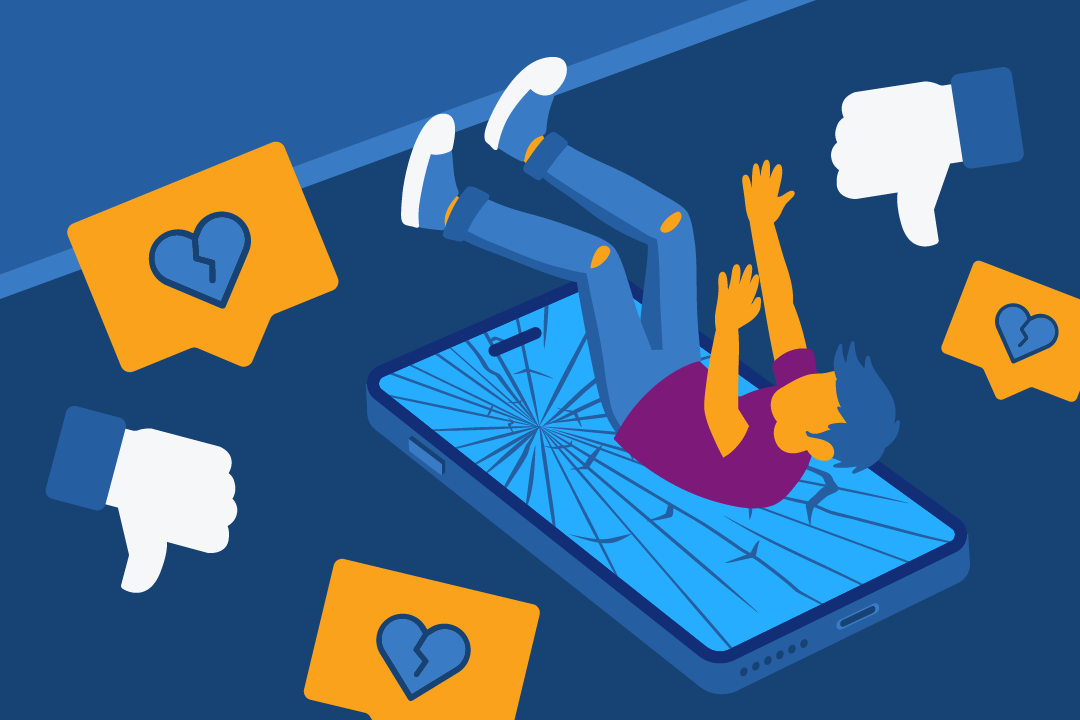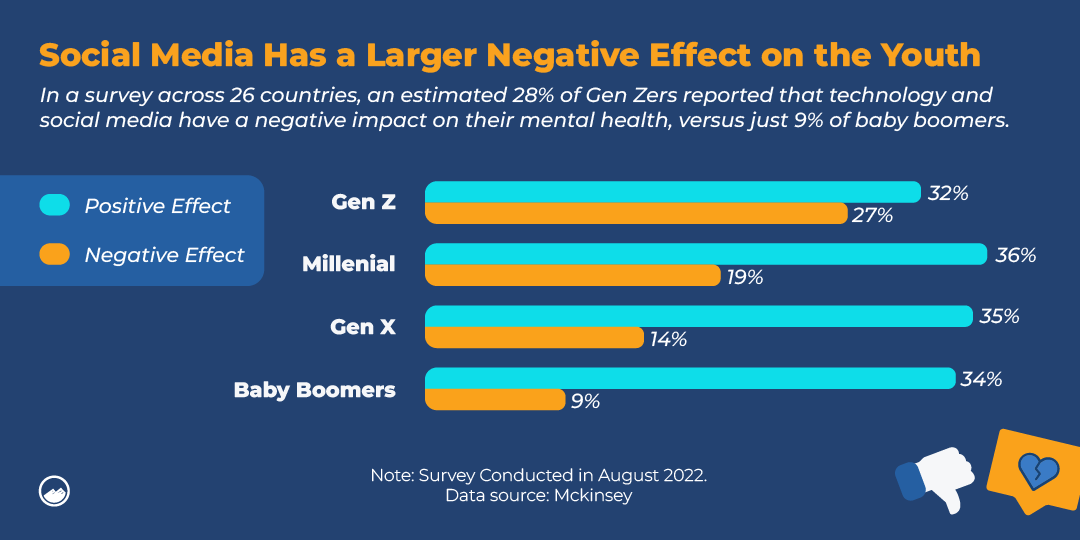The impact of social media on the mental health of Gen Z

Ilustration by Joel Daniel // Sandstone Care
The impact of social media on the mental health of Gen Z
Graphic visualization of a teenager surrounded by emojis falling onto and cracking a smartphone.
Our relationship with social media can be summed up in two words: “It’s complicated.”
Social media apps help us maintain personal connections and provide a platform for self-expression; however, many people—especially younger generations—also say social media has negatively impacted their mental health.
Sandstone Care used McKinsey data to see how social media affects the mental health of young people worldwide.
Social media platforms have been around for over 20 years. Open Diary introduced community blogging to the Web in 1998, the same year Yahoo Pager joined the fold. When Facebook came around in 2004, MySpace had already gained a one-year headstart, with YouTube and Reddit materializing two years later in 2005.
Despite its rapid evolution and prevalent use, researchers are still learning how social media affects people’s overall well-being, especially youth who have grown up with social media. As many as 95% of teens ages 13 to 17 use social media, per a 2023 Surgeon General report, and at least 35% of these users spend more than two hours a day on social media, according to McKinsey.
Many worry that social media correlates with mental health decline. The Centers for Disease Control and Prevention found that, in 2021, about 3 in 10 teens experienced poor mental health, and at least 1 in 5 have contemplated suicide. As of 2023, girls have about double the depression symptoms as boys, with nearly 3 in 5 feeling constantly sad or hopeless.
That said, it can be difficult to tie mental health directly to social media use, particularly when Gen Z suffered many ill effects from the COVID-19 pandemic, including isolation, remote learning, and economic insecurity.
Consequentially, the way Gen Z uses social media is different from other generations, which may contribute to poor mental health. Compared to other generations, McKinsey found that Gen Z uses social media more passively: Two in 5 (43%) rarely or never post, compared to 35% of millennials.
Many studies have looked at passive versus active social media use to determine whether it adversely affects mental health. While the jury is still out, there are signs that social media’s negative aspects may affect Gen Z more because they’re in a critical phase of brain development.
![]()

Ilustration by Joel Daniel // Sandstone Care
Social media affects younger people more
A bar chart showing how technology social media affects mental health of people across 26 countries. 27% of Gen Z say that technology has a negative impact on their mental health, as opposed to just 9% of baby boomers.
McKinsey found that Gen Z is more apt to say social media and technology cause them mental health problems, but that’s not the case worldwide.
Gen Zers in Europe and Oceania reported the highest rates of social media negatively impacting their mental health, whereas those in Asia reported the lowest. McKinsey noted that social media algorithms could also affect different age groups and regions of the world differently.
While Gen Z is more vocal about their displeasure with social media and technology, they still spend more time on social media than any other cohort: Nearly 3 in 5 spend at least one to two hours a day on social media, and 35% spend over two hours. Just 2 in 5 (44%) millennials are on social media at least one to two hours a day, and about 1 in 4 (24%) spend over two hours.
Lawmakers have taken up the baton to protect children on social media. Illinois passed a law in 2023 preventing the exploitation of youth influencers—particularly vloggers—stating they must receive compensation for their online work. California, Maryland, and Pennsylvania plan to follow suit.
Other states are trying to restrict minors’ access to social media to combat mental health issues; however, courts are overturning these laws on First Amendment grounds, citing people’s right to information no matter their age. In February 2024, a federal court blocked Ohio’s Social Media Parental Notification Act, which mandated social media platforms get parental permission before creating accounts for users under 16. Other states have tried to pass similar laws but are also facing court battles.
Social media companies have said it may be easier to comply with a federal law than with wildly different state laws, but Congress may experience a similar fate with proposed measures. In January 2024, Congress introduced the Kids Online Safety Act, which includes measures on minors’ privacy and safety and requires social media companies to prevent harm to youth. Still, as with similar laws, First Amendment rights may pose an uphill battle.
Story editing by Shannon Luders-Manuel. Copy editing by Paris Close.
This story originally appeared on Sandstone Care and was produced and
distributed in partnership with Stacker Studio.
